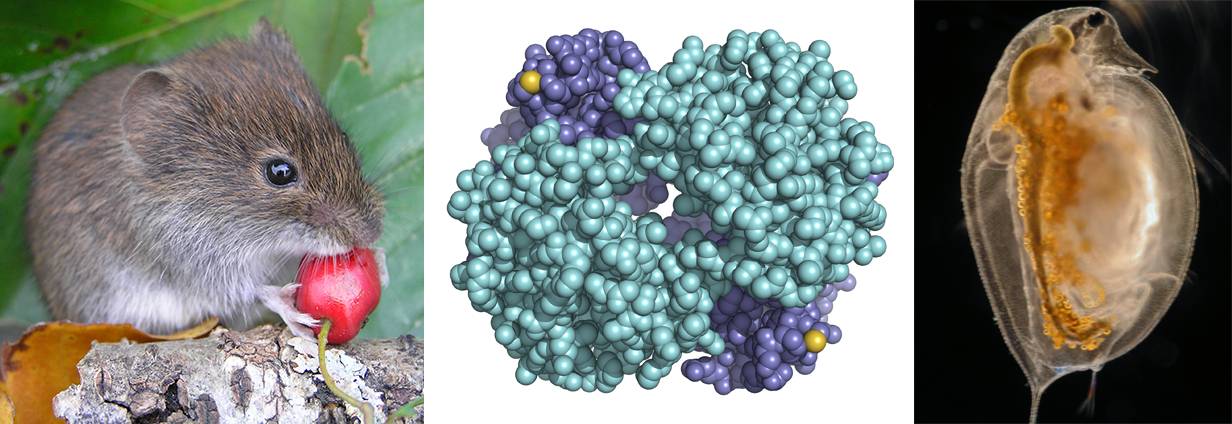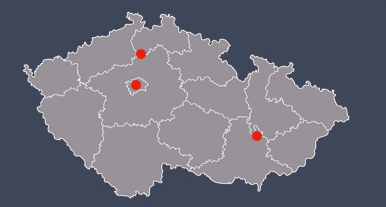
Research
Research
Head of department:
Kotlík Petr, RNDr., Ph.D.
 |
|
Laboratory video
Download link: video.
Department activity:
The main topic of our research is the response of animals to climate change, primarily after the end of the last ice age. We use knowledge of how species have responded to climate change in the past to predict how species might cope with future global warming.
We study this response from multiple perspectives and at multiple levels, including biogeography/phylogeography, population genomics, gene-environment association, environmental niche modelling, gene expression, and protein structure and function.
Our primary study species is the bank vole (Clethrionomys glareolus, also known as Myodes glareolus), but we also use several other species when they are suitable for answering specific questions or present a problem of interest in their own right. Our projects have examined the conservation genetics, biogeography, and molecular systematics of frogs and snakes, the phylogeography and interaction of historical and anthropogenic gene flow in cyprinids (freshwater fishes), and the evolutionary genetics of Holarctic Daphnia.
Our efforts have helped make the bank vole a model species for studying the response of temperate organisms to climate change (see Kotlík et al., 2022). Key discoveries include genetic evidence that this small forest mammal has survived in high-latitude “northern” glacial refugia near the Carpathians, in areas previously considered uninhabitable for forest species, or haemoglobin genes that confer resistance to oxidative stress, which is important for adaptation to climate change. Our recent chromosome-level genome assembly provides rich genetic resources that will enable large-scale re-sequencing of bank vole populations (e.g., across climate gradients) and facilitate further development of the bank vole as a model system.

Students and Postdocs:
We currently have a position available for an international postdoctoral researcher to develop their own project within the scope of our laboratory. The position is funded by the Postdoctoral Fellowship Programme MERIT (Horizon Europe MSCA-COFUND).
If you would like to join us at any level (postdoc, Ph.D. student or MSc student), please contact us.
Current research topics in our laboratory include:
Genomic basis of adaptive physiological traits
Phenotypic traits of climate stress tolerance rely on a complex and intertwined set of physiological, molecular, and biochemical mechanisms. One aspect of our work focuses on identifying genes and biological processes underlying physiological adaptation to different environmental conditions in bank vole populations that have occupied new habitats as a consequence of end-glacial climate change.
Resistance to oxidative stress and cross-adaptation between heat and hypoxia
Temperature stress due to climate change can lead to changes in the redox state of cells, which is one of the most important consequences of fluctuating environmental conditions. Building on our work on haemoglobin, this line of research aims to unravel genes and regulatory networks involved in adaptation of resistance to oxidative stress. Preliminary results suggest a role for genes previously implied in adaptation to hypoxia at high altitudes.
Predicting the potential for adaptation to global warming
An exciting research direction is the use of predictive models of future climate to estimate the extent to which global warming will lead to shifts in the optimal adaptive genetic composition of individual populations. In this way, it is possible to predict the extent to which the adaptation of individual populations will be disrupted and to assess the extent to which the adaptive variation needed to reverse the maladaptation will be available.
International Collaborations:
Prof. Jeremy B. Searle, Cornell University, USA
Dr. Hayley C. Lanier, University of Oklahoma, USA
Prof. Lawrence J. Weider, University of Oklahoma, USA
Prof. Wieslaw Babik, Jagiellonian University, Kraków, Poland
Dr. Mateusz Konczal, Adam Mickiewicz University, Poznań, Poland
Prof. France Dufresne, Université du Québec à Rimouski, Canada
Dr. Myriam Ermonval, Institut Pasteur, Paris
Prof. Heikki Henttonen, Natural Resources Institute Finland (Luke), Finland






